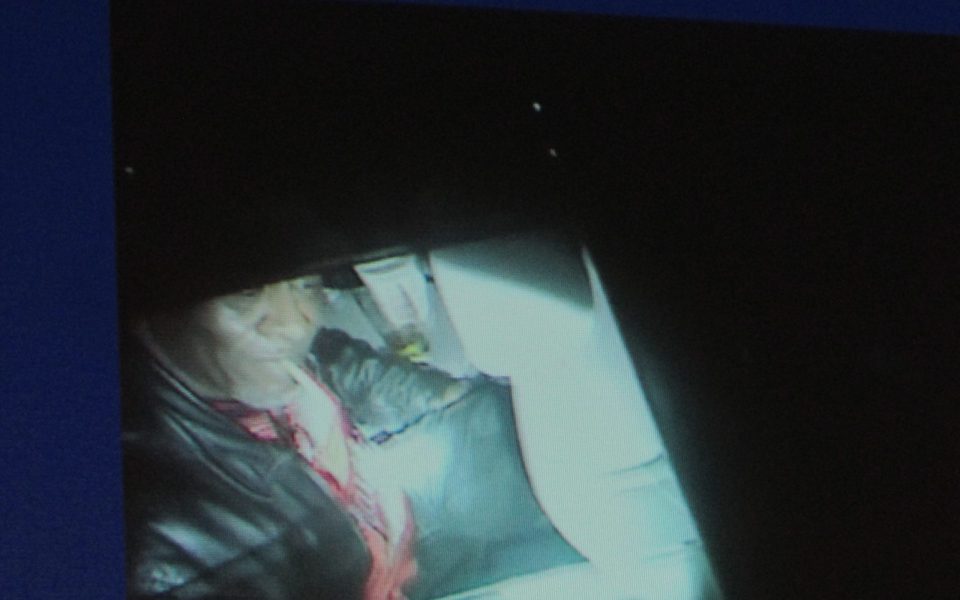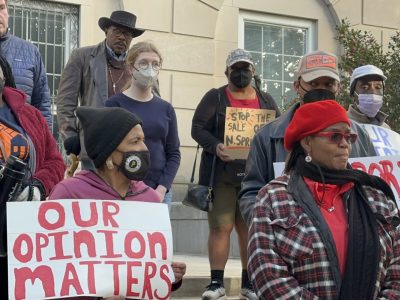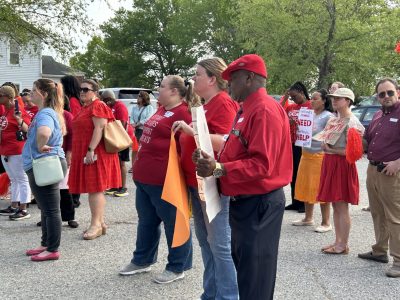A Winston-Salem police officer responsible for a fatal shooting during a traffic stop in March is returning to active duty and will not face criminal charges.

©
The Winston-Salem police officer who fatally shot a man during a traffic stop in March has been officially absolved of wrongdoing, and as of Monday he is cleared to return to active duty.
“All evidence indicates” Officer Dalton McGuire “acted appropriately and lawfully,” Forsyth County District Attorney Jim O’Neill said in a public presentation on Monday. O’Neill said he also considered a history of the victim, 60-year-old Edward Van McCrae, “resisting and assaulting officers” in determining that “no probable cause exists to charge Officer McGuire with any crime.”
Footage from McGuire’s police body-worn camera, which was released by order of a superior court judge on Monday, shows the officer pull up behind an older-model Toyota Camry on March 30, and the McGuire approach the car from the passenger side while walking on the grassy shoulder of Bowen Boulevard. McGuire greets an individual in the front passenger seat and then quickly turns his attention to the backseat to engage a man later identified as McCrae. McGuire asks McCrae what he’s holding in his hand, and soon orders him to get out of the car and lie on the ground. As the car door jerks opens, McGuire says for the first time: “Quit reaching.”
“Quit, bro!” McGuire says. “Quit man. Quit….” While McCrae’s voice is hard to hear in the audio, it sounds as though he is saying, “This is f***ed up.” O’Neill said around this point, McGuire’s body camera came loose, so that it was pointed downward along his bodyline instead of in the direction of his gaze.

©
“Stop reaching,” McGuire says with increasing urgency. “Get your hands behind your back. Get your hands behind your back.”
Then, McGuire can be heard saying, “S***! S***!” And then, “Gun. Gun…. Don’t reach for the gun!”
Soon four shots can be heard. O’Neill said the autopsy found that three of the shots from McGuire’s weapon struck McCrae. One entered and exited his arm, another pierced his back, and still another stuck him near his spine.
The grainy quality of the video posted on news outlets websites makes it difficult to discern either the gun referenced in McGuire’s comments or McCrae reaching for the weapon. But in a frame isolated for O’Neill’s slide presentation, McCrae can be seen lying on the ground while reaching into his back pocket. A subsequent frame then shows something silver glinting beneath McCrae’s leg. A third frame shows a small pistol lying on the grass near a storm drain. O’Neill also presented a photograph taken by a crime-scene investigator showing the pistol down in the storm drain.
David Freedman, a lawyer representing McGuire, said the officer is satisfied that the State Bureau of Investigation completed a thorough investigation, which showed he acted appropriately.
“He appreciates the hard work of the SBI and the district attorney’s office in exonerating him, but this process brings him no joy,” Freedman said. “The last thing he wanted to do was take someone’s life, but he was put in a position where he had no choice.”

©
Freedman said the shooting and its aftermath has been “devastating” for McGuire, who had served on the force for about two years prior to the incident.
“It’s been difficult to deal with on several levels,” O’Neill said. “It’s never easy when you take someone’s life, regardless of the situation. And then, secondly, since last March his actions have been called into question quite publicly. He knew he had done nothing wrong, but he had to wait for the process to play out.”
McCrae’s family could not be reached for comment, and their lawyer, John Vermitsky, did not return messages for this story.
During the months that the shooting remained under investigation, community members expressed concern on social media and in the streets. Winston-Salem State University students held a die-in, and community members joined by the Revolutionary Action Movement and the International Socialist Organization marched down Fourth Street chanting, “When black lives are under attack, what do we do? Stand up, fight back.”
Michael Banner, one of the community members who has closely monitored the official handling of the investigation into McCrae’s death, said he was not satisfied with the outcome.
“My impression, from what I’ve heard and learned of it is that the officer acted in an aggressive fashion and manner by first of all pulling over the car,” Banner said. “Being apprehended in that aggressive manner over an expired license tag, for [McGuire] to pull up and not go to the driver’s side, but instead go to the passenger rear side and start scrutinizing Ed McCrae, what I read is [McCrae] turned his back. I felt like [the officer] was looking for that trouble. I didn’t know if he had a prior run-in or he had heard about him. I felt like he was in the wrong; he made that happen.”
O’Neill said McGuire initiated the stop after running a “DMV query” and got back “a limited expired status, which could be anything from the taxes hadn’t been paid when the vehicle was registered…. In addition, it showed that the owner of that vehicle had a suspended driver’s license.”
After McGuire initiated the stop, O’Neill said the officer noticed the backseat passenger’s head moving side to side, which caused him to focus his attention on McCrae. Later, after engaging McCrae, McGuire became concerned that McCrae was concealing something, leading him to order him out of the car. O’Neill said McCrae’s toxicology report indicates that he tested positive for cocaine and marijuana.
O’Neill said the traffic stop was lawful, adding, “As far as the law is concerned, McGuire can order McCrae to get out of the vehicle when he stops the car.”
Banner questioned both the need for the traffic stop and McGuire shifting his attention from the driver to the backseat passenger. He noted that potentially deadly encounters with the police are structured by economic status.
“A lot of people in their highly distressed communities, it’s either pay the taxes and fees for the license or get this immediate food,” Banner said. “The choice is going to be get the food. With the heavy police presence in East Winston… I don’t see nothing positive coming out of it. They put [the officer] right back out on the street. It doesn’t look good. I’m not hopeful. I don’t have those things — my license — paid up. I’ll just go ahead and walk downtown; that’s how it’s affected me.”
Banner also faulted the emphatic media coverage of the district attorney’s decision to absolve the officer with sending a message that residents should be prepared to submit to police abuse.
O’Neill’s presentation included slides stating that the front passenger of the vehicle, who is related to McCrae, was recorded at the Public Safety Center saying to himself: “Unc, why would you do something like that?” But O’Neill also said, “The driver felt like the officer was yelling at McCrae, being aggressive with McCrae.”
O’Neill said he relied on the Supreme Court’s 1989 Graham v. Connor ruling in determining that McGuire’s use of deadly force against McCrae was lawful. “The reasonableness of a particular use of force must be judged from the perspective of a reasonable officer on the scene, rather than with the 20/20 vision of hindsight,” the ruling says. “The calculus of reasonableness must embody for allowance for the fact that police officers are often forced to make split-second judgments — in circumstances that are tense, uncertain, and rapidly evolving — about the amount of force that is necessary in a particular situation.”
O’Neill said 90 percent of the incident was captured on McGuire’s body-camera video, but he also considered other evidence, including McCrae’s prior contacts with police. The slide presentation itemized a lengthy list, including a 1981 conviction for assaulting law enforcement, a 1983 incident in which he allegedly attempted to run over an arresting officer, and multiple convictions through 2000 for resisting a public officer.
“Some of the other things we have to look at is when McCrae had prior contacts with police, how did he handle himself?” O’Neill said. “What did he do? How did those situations go? My point is that this is not designed to embarrass McCrae or his memory. And it’s not designed to embarrass his family. I had an opportunity before the hearing to speak with McCrae’s sisters, and I can tell you that I came away from that meeting believing that his family cared about him, loved him and supported him, and that his family, they are decent, good people, and they certainly didn’t ask for this attention, nor did they deserve it.”
Join the First Amendment Society, a membership that goes directly to funding TCB‘s newsroom.
We believe that reporting can save the world.
The TCB First Amendment Society recognizes the vital role of a free, unfettered press with a bundling of local experiences designed to build community, and unique engagements with our newsroom that will help you understand, and shape, local journalism’s critical role in uplifting the people in our cities.
All revenue goes directly into the newsroom as reporters’ salaries and freelance commissions.





Leave a Reply